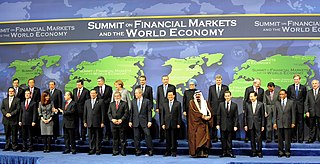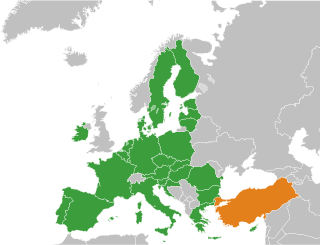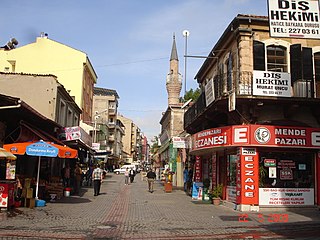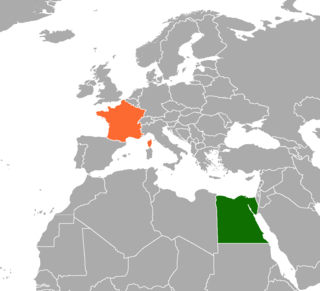Related Research Articles

The Foreign relations of Egypt are the Egyptian government's external relations with the outside world. Egypt's foreign policy operates along a non-aligned level. Factors such as population size, historical events, military strength, diplomatic expertise and a strategic geographical position give Egypt extensive political influence in the Middle East, Africa, and within the Non-Aligned Movement as a whole. Cairo has been a crossroads of the Arab world's commerce and culture for centuries, and its intellectual and religious institutions are at the center of the region's social and cultural landmarks.
The foreign policy of Lebanon reflects its geographic location, the composition of its population, and its reliance on commerce and trade. Until 2005, Lebanon's foreign policy had been heavily influenced by Syria, however beginning with the formation of Hezbollah in 1982, Iran had gradually grown to heavily influence Lebanon.

Physically bridging Europe and Asia, Turkey is a secular country that has pursued a Western-oriented foreign policy. To this end, Turkey uses its global diplomatic network—the fourth most extensive—of 246 diplomatic and consular missions.

A think tank, or policy institute, is a research institute that performs research and advocacy concerning topics such as social policy, political strategy, economics, military, technology, and culture. Most think tanks are non-governmental organizations, but some are semi-autonomous agencies within government, and some are associated with particular political parties, businesses or the military. Think tanks are often funded by individual donations, with many also accepting government grants.

In international relations, a middle power is a sovereign state that is not a great power nor a superpower, but still has large or moderate influence and international recognition.

Turkey is negotiating its accession to the European Union (EU) as a member state, following its application to become a full member of the European Economic Community (EEC), the predecessor of the EU, on 14 April 1987.

Pascal Lamy is a French political consultant and businessman. He was the Director-General of the World Trade Organization (WTO) from 1 September 2005 to 1 September 2013 for 8 years. In April 2009, WTO members reappointed Lamy for a second 4-year term, beginning on 1 September 2009. He was then succeeded by Roberto Azevêdo. Pascal Lamy was also European Commissioner for Trade for 5 years, from 13 September 1999 to 22 November 2004 and is an advisor for the transatlantic think-tank European Horizons, as well as currently serving as the Honorary President of the Paris-based think tank, Notre Europe.

Uşak is a city in the interior part of the Aegean Region of Turkey. It is the seat of Uşak Province and Uşak District. Its population is 236,366 (2022).

Olivier Roy is a French political scientist, professor at the European University Institute in Florence, Italy. He has published articles and books on secularisation and Islam including "Global Islam", and The Failure of Political Islam. He is known to have "a different view of radical Islam" than some other experts, seeing it as peripheral, Westernized and part of a radicalized and "virtual" rather than pious and "actual" Muslim community. More recently he has written on the Charlie Hebdo shooting, and the November 2015 Paris attacks.

Élisabeth Guigou is a French politician of the Socialist Party who served as a member of the National Assembly from 2002 until 2017, representing Seine-Saint-Denis' 9th constituency.
The International Strategic Research Organization is an independent think-tank established in 2004. It pursues interdisciplinary studies on national and international political, economic and security issues.

Henri de La Croix de Castries is a French businessman. He was chairman and CEO of AXA until retiring from both roles on 1 September 2016.

The Graduate Institute of International and Development Studies, also known as the Geneva Graduate Institute, is a public-private graduate-level university located in Geneva, Switzerland.
Turks in France also called the Turkish-French community, French Turks or Franco-Turks refers to the ethnic Turkish people who live in France. The majority of French Turks descend from the Republic of Turkey; however there has also been Turkish migration from other post-Ottoman countries including ethnic Turkish communities which have come to France from North Africa, the Balkans, the island of Cyprus, and more recently Iraq, Lebanon, and Syria. There has also been migration to France from the Turkish diaspora

The Turkish population refers to the number of ethnic Turkish people in the world. During the Seljuk (1037–1194) and Ottoman (1299–1923) eras, ethnic Turks were settled across the lands conquered by the two empires. In particular, the Turkification of Anatolia was the result of the Battle of Manzikert in 1071 and the formation of the Sultanate of Rum. Thereafter, the Ottomans continued Turkish expansion throughout the regions around the Black Sea and the Mediterranean Sea. Consequently, today the Turkish people form a majority in Turkey and Northern Cyprus. There are also significant Turkish minorities who still live in the Balkans, the Caucasus, the Middle East and the Levant, and North Africa.
Sedat Laçiner is a Turkish academic specialist on the Middle East and International Relations, with particular reference to Turkish foreign policy and rector of Çanakkale Onsekiz Mart University (COMU).

Egypt–France relations, also known as Egyptian–French relations, are the bilateral relations between Egypt and France. Relations between the two countries have spanned centuries, from the Middle Ages to the present day. Following the French occupation of Egypt (1798-1801), a strong French presence has remained in Egypt. Egyptian influence is also evident in France, in monuments such as the Luxor Obelisk in Paris. The relationship is also marked by conflicts like the Algerian War (1954-1962) and the Suez Crisis (1956). As of 2020, relations are strong and consist of shared cultural activities such as the France-Egypt Cultural Year (2019), tourism, diplomatic missions, trade, and a close political relationship. Institutions like the Institut d’Égypte, the French Institute in Egypt and the French University of Egypt (UFE) also aid in promoting cultural exchange between Egypt and France.
Institut Montaigne is a think tank based in Paris, France, founded in 2000. Institut Montaigne's makes public policy recommendations to advance its agenda, which broadly reflects that of the large French companies that fund it. It contracts experts from the French business community, academia, civil society and government.

Emmanuel Roberto Goffi is a French philosopher of technologies and, more specifically, an artificial intelligence ethicist. He has served in the French Air Force for 27 years. He is the co-founder and co-director of the Global AI Ethics Institute in Paris. He is also an instructor and research associate with the Frankfurt Big Data Lab at the Goethe University Frankfurt in Germany and a research fellow with the Centre for Defence and Security Studies at the University of Manitoba, Winnipeg, Manitoba in Canada. After having worked on military ethics, and more precisely on ethics applied to Lethal autonomous weapon, his focus has turned to ethics applied to Artificial intelligence.
There were multiple newspapers published in the Ottoman Empire.
References
- ↑ Nathalie Tocci (1 September 2011). Turkey’s European Future: Behind the Scenes of America’s Influence on EU-Turkey Relations. NYU Press. p. 210. ISBN 978-0-8147-8416-7.
- ↑ İhsan Bal; M. Turgut Demirtepe (1 January 2012). USAK Yearbook of Politics and International Relations: Volume 5. International Strategic Research Organization (USAK). p. 70. ISBN 978-605-4030-69-9.
- ↑ Joachim Klewes; Robert Wreschniok (13 October 2009). Reputation Capital: Building and Maintaining Trust in the 21st Century. Springer Science & Business Media. p. 283. ISBN 978-3-642-01630-1.
- ↑ Daziano, Laurence (7 August 2019). "Istanbul, catalyseur du renouveau turc". Les Echos. Retrieved 22 February 2020.
- ↑ Güneş, Handan (12 September 2019). "AB ilişkilerinde güven eksikliğinin aşılması, dev bir iş birliği potansiyeli sağlar". Anadolu Ajansi. Retrieved 22 February 2020.
- ↑ "Message from the President". institute-bosphore.org. Institute du Bosphore. Retrieved 22 February 2020.